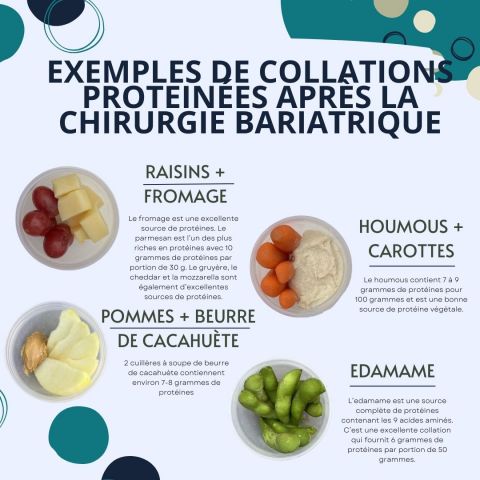News - 03/10/2024
THE IMPORTANCE OF A PROTEIN RICH DIET AFER BARIATRIC SURGERY
Proteins are an essential part of every cell in the human body.
After undergoing bariatric surgery, maintaining a balanced and protein-rich diet is crucial to a successful recovery and long-term health for several reasons:
1) Tissue Repair and Regeneration:
Bariatric surgery brings about significant changes in your body, including a reduced stomach size and/or rerouting of the digestive system.
Protein plays a vital role in repairing tissues, aiding in the recovery process by rebuilding and regenerating cells and insuring proper healing.
2) Maintaining muscle mass:
When patients experience rapid weight loss after bariatric surgery, a high protein diet can help lessen the risk of muscle loss that comes with it.
3) Metabolism Boost and Satiety:
Protein is essential for boosting the metabolism. A higher metabolic rate supports weight management and promotes satiety, preventing overeating.
Weight loss efforts are better supported, and weight regain is minimized.
Protein goals after bariatric surgery:
The daily protein target for post-bariatric patients ranges from 60-80 grams. Prioritizing high-quality protein sources is crucial to supporting recovery and overall well-being.
The best protein sources are complete proteins (containing all 9 amino acids your body needs but does not produce). Most higher-quality complete proteins are animal-based however there are many plant-based complete protein options as well:
- Chicken
- Fish
- Eggs
- Dairy products
- Quinoa
- Tofu
- Edamame
Incomplete proteins, while lacking one or more essential amino acids (or not containing adequate levels of) , are still good protein options for vegetarians or vegans:
- Beans
- Lentils
- Nuts and seeds
- Grains
- Vegetables
Most plant-based proteins are incomplete but can combined with other plant-based protein sources (i.e: rice + broccoli) to enhance overall amino acid intake.
While drinking protein supplements can be a good option in the liquid phase of the post operative period, in the long term, eating solid proteins is crucial to long term success as patients feel full for longer periods of time which in turn helps to reduce snacking.
During meals, proteins should be consumed first, then starches (breads, grains, beans) and finally vegetables and fruits.
For more complete information on dietary rules after bariatric surgery and to ensure long term results, be sure to check in regularly with your nutritionist
♦ To make an appointment with Dr. Bruto Randone, Digestive and Bariatric Surgeon, at the Clinique Internationale du Parc Monceau, 21 Rue de Chazelles, 75017 Paris, France, or at the Clinique Bizet, 23 Rue Georges Bizet, 75116 Paris, France, click on Contact

